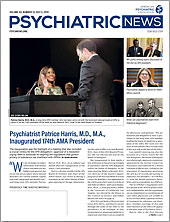There is a growing interest in using speech recognition software to help diagnose psychiatric problems. Such technology can provide objective data related to the quality or content of a patient’s speech that can supplement the subjective information gleaned from a clinical interview.
While much speech analysis research has focused on Alzheimer’s disease and schizophrenia, a study by investigators at New York University (NYU) Langone Health and the Stanford Research Institute (SRI) has now demonstrated that speech patterns can accurately identify people with posttraumatic stress disorder (PTSD). These findings were reported in Depression and Anxiety.
“The tools you need to collect audio data are cheap, abundant, noninvasive, and don’t even require the subject to be in the same room as you,” said lead study investigator Charles Marmar, M.D., the Lucius N. Littauer Professor and chair of the Department of Psychiatry at NYU School of Medicine. “It seems natural that speech samples can be used in psychiatry as blood tests are in other medical fields.”
Marmar became interested in using speech analysis for PTSD after doing telephone-based therapy with his patients. “I realized that their voices were conveying so much information beyond their actual words,” he said.
He organized a multidisciplinary team of clinicians, mathematicians, and engineers to study the speech of 129 male veterans of the Iraq and Afghanistan wars. The participants were all assessed for PTSD using the Clinician-Administered PTSD Scale for DSM-IV (CAPS-IV), considered a gold-standard diagnostic tool; 52 of the veterans screened positive for PTSD and 77 did not.
The CAPS interviews for each participant were recorded and analyzed with special software developed by NYU’s collaborators at SRI (SRI was the institute that created Apple’s voice assistant Siri). The software compared over 40,000 different audio markers including rhythm, volume, tone, and affect (how a voice changes in response to emotional stimuli). As Marmar told Psychiatric News, “We looked at the physics of the speech, not the lexicon.”
The analysis revealed a set of 18 speech-related features that were different between veterans with and those without PTSD. Using these features as diagnostic criteria, the software could distinguish individuals with or without PTSD with 89% accuracy.
Most of these differences related to tone and affect, in that veterans with PTSD had speech that was flatter and more monotonous than those without PTSD. Slow speech and long hesitations were also more common among veterans with PTSD. Marmar said these findings reinforce anecdotal reports of how veterans with chronic PTSD tend to speak. (PTSD is also associated with aroused and jittery speech, but Marmar said such speech patterns usually occur when the trauma is more recent. All the participants in this study had been coping with PTSD for years.)
The researchers found that the presence of a traumatic brain injury (TBI) or alcohol use did not skew the results. Many of the veterans with PTSD also had elevated depressive symptoms, but these symptoms were not strongly contributing to the speech differences either, the authors noted.
While the results suggest speech software can objectively differentiate people with PTSD from those without, Marmar and colleagues cautioned that this study did not include any veterans who had a diagnosis of major depression—a disorder also characterized by slow, hesitant, and flat speech. Marmar said that future studies should compare the voice patterns between veterans with PTSD and those with major depression to see if the software retains its diagnostic accuracy.
While speech analysis could be used in multiple settings, Marmar sees this tool initially being deployed in military or first-responder populations. “This would enable us to screen a large group of individuals getting ready to deploy and see which ones are psychologically prepared,” he said. “A professional could accomplish that with a CAPS, but a CAPS interview can take a couple of hours if a person has a complicated trauma history.”
In addition, though CAPS is generally reliable, the assessment relies entirely on what participants or their family are willing to share, Marmar continued. “Many individuals who serve in the military, police, or fire department want to be able to keep serving, and they may be wary of disclosing their distress,” he said. Recording an individual’s voice during a nonclinical discussion or debriefing could offer another way to obtain information about individuals who may have PTSD, he said.
The study was supported by a grant from the U.S. Army Medical Research Acquisition Activity and Telemedicine and Advanced Technology Research Center with additional support from the Steven and Alexandra Cohen Foundation. ■
“Speech‐Based Markers for Posttraumatic Stress Disorder in U.S. Veterans” is posted
here.

